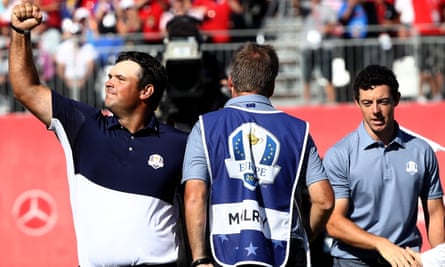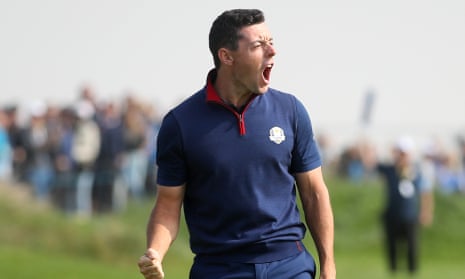When Rory McIlroy used a devilish pre-Masters question about voting rights to call the United States “the best country in the world” it was easy to sense another blow to the once-ferocious rivalry that existed in the Ryder Cup. How could McIlroy and the other residents of Florida who represent Europe for a week every two years possibly feel antipathy towards their adopted home?
Perfectly easily, as it transpires. McIlroy expanded on his “best country” remark by pointing to the convenience of life for someone in his “fortunate” sporting position. McIlroy admires this “land of opportunity.” Yet one glance at his face upon his singles defeat to Justin Thomas at Le Golf National in 2018 or his hulk-like demeanour when losing narrowly to Patrick Reed in the same format two years earlier reveals someone who can very easily turn against the star-spangled banner. The Ryder Cup is not the cosy domain of those who frequent the coffee shops of West Palm Beach.
“One hundred per cent, oh yes,” McIlroy says when asked whether competitiveness comes easily to him. “You are part of a team, playing against another team. The competitor comes out in you.
“I could be playing against my best friend in something and you put that aside because the competitor in you just wants to win. Justin is one of the guys I’m closest to out here and I was dejected when he beat me. You want to win, you want to do it for your team.
“I looked that way after JT beat me because I had not put a point on the board for the team. Going in to Hazeltine in 2016, I was very proud of my singles record. I hadn’t lost in three and had two really good wins over Rickie Fowler and Keegan Bradley. Losing to Patrick there was tough to take even though I was part of a great match.
“The match with JT was great too but to be beaten on the last hole both times, in a Ryder Cup? That’s tough to take. You are put out in a position, up in the order, to put blue on the board and I didn’t do that. But it doesn’t at all mean that after that you don’t go back out and cheer the boys on as much as possible.”
There is concern in some quarters that home wins are becoming too much the norm in the Ryder Cup. Europe have won once in the US since 2008. “It’s going to go more and more like that,” says McIlroy. “It’s becoming tougher to win on the road as it becomes more partisan. You are not just playing the other team, you are playing the fans and especially this year where European fans cannot travel. That keeps it interesting in the sense that a road win feels much more meaningful.”

Pádraig Harrington, Europe’s captain, has floated the idea of a neutral course setup. “If you want away teams to have a better chance to win it’s a good idea but I do think there is such a thing as home advantage,” McIlroy says. “Most other sports have that so there is no reason that shouldn’t happen in the Ryder Cup.”
When McIlroy was starting out on his career in Europe, Harrington was winning majors and making regular playing appearances on this side of the Atlantic. The pair have less of a connection, therefore, than McIlroy had with Darren Clarke or Graeme McDowell. Yet Harrington is full of enthusiasm about McIlroy’s behind-the-scenes contribution to this Ryder Cup even before a ball is struck. The respect is mutual.
“Pádraig is very smart, very analytical,” says McIlroy. “Captains are made by who they have around them as well. It’s not just the captain making the decisions, it’s the vice-captain and other people around the team. But the captain sets the tone for the week.
“For the first few days, it’s about getting across how you want the week to feel for your team. Thomas Bjørn did a very good job of that in Paris and Pádraig was a part of that process so I’m sure he will want to do something pretty similar.”
It is difficult to know what to make of McIlroy this season. Shortly after a coaching shake-up he won for the 19th time on the PGA Tour, at Quail Hollow in May. A tie for seventh at the US Open – where McIlroy did threaten to win for a spell – and his role in a play-off for bronze at the Olympics were subsequent highlights. However McIlroy’s wait for a major title will lapse into an eighth year, an extraordinary state of affairs for someone of his talent.
It would be a mistake, though, to assume the 32-year-old places extra emphasis on this environment after – by his standards – a low-key run. “It’s not about how you do as an individual,” he says.
“It’s about what you do for the team. If you can help the team win that cup, that’s the most important thing. I have always said it; I would happily go zero and five if it meant the team wins.” With the odd associated grimace, that is.
